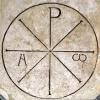Be Careful What You Ask For . . .
Be Careful What You Ask For
“I pray that Christ may dwell in your hearts
through faith . . . so that you may be filled
with all the fullness of God.”
– from Ephesians 3:16-19

“I pray that Christ may dwell in your hearts
through faith . . . so that you may be filled
with all the fullness of God.”
– from Ephesians 3:16-19
There’s an old saying – probably most of us have used it at one point or another – that goes something like this: Be careful what you wish for, you just might get it. We might Christianize that a bit, and say instead, “Be careful what you pray for, you may not realize what you’ll be getting if God’s answer is yes.” One example of this is the oft-heard, “I’ve learned not to pray for patience, because the learning of the lesson is tough.”
In the first several weeks of this long season after the Day of Pentecost, we are pondering two themes: the identity and ministry of the Church as the embodied presence of Christ in the world; and the character, content, and modes of our worship of God, both together in community and in our individual times of devotion and praise. This week (the ninth Sunday after Pentecost in 2021), the lectionary asks us to consider what it means—what it really means—that Christ dwells in our hearts through faith. Is it really our prayer that we may be filled with all the fullness of God? Are we willing to be and to do whatever is necessary in order to be strengthened in our inner selves, and to comprehend and embody the love of Christ that surpasses knowledge? If we look earlier in Ephesians chapter 3, we’ll see that we will most likely be required to be transparent, before God and with one another; our faith might be put on display; we may have to suffer, perhaps even sacrifice, in ways we weren’t prepared for and to a degree we may feel unable to sustain. Are we willing to deeply repent, if and when that becomes necessary (as we see in the narrative of David and Bathsheba in 2 Samuel 11-12)? Are we willing to acknowledge God as the source of our dependence and provision, the One on whom we depend in complete faith for all of our daily needs, physical and spiritual? And do we trust Him, even when He asks us to believe and to do what is difficult for us (as we see here and in the next few weeks in the readings in John 6, when Jesus reveals Himself to His disciples as the Bread of Life come down from Heaven)?
Are we willing to allow our faith, and our lives, to be “on display” so that “the many-sided wisdom of God in all its infinite variety and innumerable aspects might now be made known through the church” (Ephesians 3:10, Amp.)?
If we are willing, then we will be able to say with Paul that God “is able to do exceedingly, abundantly beyond all that we ask or think, according to the power that works within us.”
Revised Common Lectionary, Proper 12B:
2 Samuel 11:1-16 Psalm 14
2 Kings 4:42-44 Psalm 145:10-18
Ephesians 3:14-21
John 6:1-21
Note: If you are readinng this post during the season of Pentecost, Year B, you can find a sample liturgy for Pentecost 9B in the Liturgy Folio.)
Image credit: Chrismon Sancti Ambrosii, Milan Cathedral (1669)
Copyright ©2021 Ellen Koehler. All Rights Reserved.


Login or Register
to view and post comments